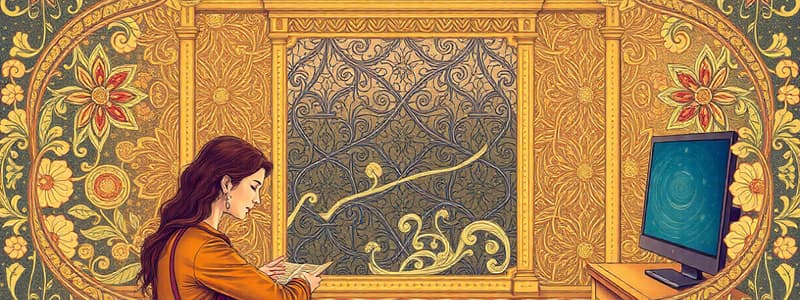Podcast
Questions and Answers
What does ICT stand for?
What does ICT stand for?
Information and Communications Technology
Which of the following is NOT a component of ICT?
Which of the following is NOT a component of ICT?
- Hardware
- Database Analysis (correct)
- Software
- Procedures
Information is the raw material of any ICT system.
Information is the raw material of any ICT system.
False (B)
What are the physical components that make up the ICT system called?
What are the physical components that make up the ICT system called?
What role does ICT play in modern education?
What role does ICT play in modern education?
The ________ refers to the legal concept giving the creator exclusive rights to a work.
The ________ refers to the legal concept giving the creator exclusive rights to a work.
Which of the following is a key feature of ICT systems?
Which of the following is a key feature of ICT systems?
Name one ethical problem related to the use of computers.
Name one ethical problem related to the use of computers.
System software is low-level software that manages and controls a computer's ________.
System software is low-level software that manages and controls a computer's ________.
Flashcards are hidden until you start studying
Study Notes
Information and Communications Technology (ICT)
- ICT encompasses a range of technologies facilitating communications, combining diverse technologies through common transmission lines and formats.
- Information is the knowledge acquired through various means such as reading and research, foundational for critical thinking.
- Communication involves applying knowledge in practical contexts.
Importance of ICT
- Revolutionizes education and data management, enhancing learning experiences.
- Provides extended access to resources, benefiting individuals with varying schedules.
- Engages learning through interactive tools catering to different styles, making content captivating.
- Ensures consistent quality of information across platforms and elevates presentation standards with multimedia.
- Streamlines processes like data collection and file transfer, exemplified by e-learning.
- Transforms engagement with knowledge, establishing ICT as essential in modern education.
Components of ICT
- Data: The raw material processed by ICT systems to generate information.
- Hardware: Tangible components of ICT systems, such as devices that can be physically touched.
- Software: Intangible computer programs guiding hardware operations.
- Information: The output produced from processing data.
- Procedures: Structured actions ensuring smooth operation of the system.
- People: Users who provide data and make decisions based on system outputs.
Importance of ICT in Philippine Society
- As an archipelagic country, ICT enhances connectivity and aligns with global trends like Web 3.0.
- Boosts productivity and efficiency through improved communication in communities and organizations.
Key Features of ICT Systems
- Digital Interconnectedness: Seamless communication between devices and platforms.
- Adaptability: Systems evolve in response to user needs and technology advancements.
- Reliability: Consistent service performance and availability.
- Processing: Handling and manipulating data efficiently.
Online System Functions
- Facilitates user interaction for data collection tailored to specific needs.
- Types of online systems include:
- Social Networking: Platforms like Facebook, TikTok, and Instagram.
- Search Engines: Services such as Google.
- Online Storage: Tools like Google Drive.
- Collaborative Tools: Applications like Prezi.
Online Safety and Ethical Principles
- Ethics: Moral principles dictating acceptable computer usage, derived from the Greek 'ethos' meaning customs.
- Computer Ethics: Regulates the ethical use of computers.
- Copyrights: Legal rights protecting original works for creators over limited periods.
- Netiquette: Standards for internet use, assessing information reliability and associated risks.
Ethical Problems Related to Computer Use
- Privacy concerns.
- Issues regarding property rights.
- Accessibilty challenges.
- Accuracy of information.
- Threats from hacking, cracking, and virus creation.
- Software piracy ramifications.
System Software
- Low-level software managing hardware and providing foundational services to higher-level software, including operating systems.
Studying That Suits You
Use AI to generate personalized quizzes and flashcards to suit your learning preferences.




